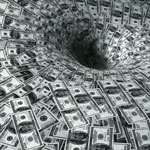![]() The Daily Reckoning U.S. Edition
The Daily Reckoning U.S. EditionHome . Archives . Unsubscribe 
The Daily Reckoning | Friday, September 3, 2010 Fed Vows to Maintain Public Financial Health And other things to comfort an economy in critical condition
Reckoning today from Paris, France...
Bill Bonner
Extend and pretend...
That's the government's way of handling the crisis. Extend credit and cash to those who don't deserve it. Then, pretend that everything is okay...
But the problems don't go away. They just get stretched into the future...
What did the feds do for GM? They took over the company. They extended cash and credit. They put in place a "Cash for Clunkers" program to encourage people to buy cars. Then, they pretended that the problems were solved.
But yesterday's news tells us that "August car sales plunged."
They hadn't really solved the problems at all. General Motors still needed to be restructured. And there weren't really anymore qualified auto buyers than there had been before. They had merely been encouraged to buy sooner...rather than wait until their cars were really worn out.
And look at what happened in the housing market.
July sales set a new record low. Why? Because the feds had encouraged people to buy earlier - by giving them cash incentives, via tax credits. For a while, it looked like the housing industry was picking up. But had any of the real problems been solved?
Nope.
Nearly 15% of all mortgage loans are either overdue or in foreclosure. And nearly one in four houses with mortgages is underwater. Another 5% barely have their heads above water, with equity of 5% or less.
When a house sinks under the waterline - that is, when its market value is less than its mortgage - the owner goes through the usual pattern of disbelief, denial, defeat and eventual desperation. If he loses his job or gets divorced the timeline is shortened. Either way, he ends up in the same place - desperate to get back on the surface where he can breathe again. It takes time. It's painful. But the longer the housing market takes to recover, the more these people give up and default on their mortgages.
The US financial system is still holding hundreds of billions worth of mortgage debt that isn't going to be repaid. Who's going to take those losses?
The feds have already made it clear - it won't be the big banks. They extended cash and credit to the banks and pretended everything was okay. The Fed itself bought up much of the big banks' bad mortgage debt already; it holds it in its vault and calls it an "asset." And the US government nationalized the biggest, most reckless and irresponsible lenders - Fannie Mae and Freddie Mac. So now the taxpayer takes the losses - even if he never bought a house...and never invested a penny in the housing industry.
And we're only talking about the domestic housing market - not about commercial loans. All together, the problem is still huge...and still there...
..and if housing prices fall - almost certain to happen as this "shadow inventory" hits the market - one out of every three mortgaged houses is likely to sink underwater, with millions of new defaults, foreclosures and distressed sales.
Extend...and pretend...and maybe the problem will go away. Or maybe the situation will become so confused that nobody knows whom to blame or what to think!
Ben Bernanke is hoping for the former and counting on the latter. He answered questions in Congress yesterday. At least one of the politicians wanted to know: "If you're so smart how come you told us that the subprime crisis would be 'contained.' How come you didn't seem to have any idea what was happening or what to do about it?"
"Okay...well... We were wrong about subprime...and we missed some signals," said the former Princeton professor of Finance, in so many words, "but you can count on the Fed to regulate the financial industry from here on. No problem."
Bernanke went on to describe how he thought financial problems got into the system and how they became hard to control.
"They are like bacteria...like e-coli..." he said (or words to that effect...we don't have the transcript in front of us, just the press report). "It is always dangerous. But you can control it if you use the proper procedures. Once it is out in the bloodstream there's not much you can do. It can be fatal."
Once again we see the same delusion...that corrections are alien invaders that can be fought and beaten...diseases that can be controlled and cured...problems that can be corrected.
Bernanke misunderstands the most basic and simple nature of an economy. With its new regulatory powers, he imagines the Fed as the Bureau of Public Financial Health, carefully inspecting the meat and making sure the kitchens are clean. If he does his job well, he implied, we won't have to worry about financial crises ever again. All we have to do is to get the bankers to wash their hands after making a loan!
Uh uh... That's not how it works. The problem was the bubble economy. It was caused by miscues and phony signals coming from the Fed (along with some other circumstances over which the Fed had no control).
The solution is the correction... In other words, the correction is the good part of the cycle. The bad part of the cycle was what created the need for it.
Once the mistakes have been made, they need to be corrected. A correction is not a disease - it's the treatment. Mistakes are inevitable...especially when you have Greenspan, Bernanke et al misleading investors and business with their phony money, artificial lending rates and crackpot theories.
Thank God there are corrections to fix them.The Daily Reckoning Presents Print Money and Be Damned!
Japan was the world's most admired economy in the '80s. Then it was the world's most despised economy in the '90s. By 1995, economists pointed their fingers and laughed - the world's most admired businessman had lost his left shoe.
Bill Bonner
But now, much of the world is barefoot. The US inflation rate has been going down since the early '80s and was cut in half since last year. It now hovers barely above zero. Surely Japan - where prices have been falling for two decades - has something to tell us. As we pointed out last week, the Nipponese have been in decline for the last 20 years - with lower stock prices, falling real estate prices, and a falling GDP. Even the population has been sliding for the last five years
This week the Japanese decided to throw some more grit on the slope. Japan's central bank governor, Masaaki Shirakawa, said he was boosting his "special loan facility" by 10 trillion yen, about $120 billion. And Mr. Naoto Kan, Japan's Premier, said he would support the central bank, adding a "second pillar of stimulus' of some 920 billion yen. The numbers always sound impressive in yen. But they are unlikely to give the economy much traction.
Professors Ken Rogoff and Carmen Reinhart studied 15 economic crises over the last 75 years. What they found was what you'd expect: real recoveries in the post-Keynes era are rare. Instead, in the 10 years following a crisis, economic growth rates are lower and unemployment is higher than in the years preceding the crisis. In two thirds of the episodes, jobless rates never recovered to pre-crisis levels, ever. And in 9 out of 10 of them, housing prices were still lower 10 years after the crisis ended.
"Our review of the historical record, therefore, strongly supports the view that large, destabilizing economic events produce big changes in the long-term indicators, well after the upheaval of the crisis. [Up to now," the authors warn, "we have been traversing the tracks of prior crises. But if we continue as others have before, the need to de- leverage will dampen employment and growth for some time to come."]
It was perhaps this scholarly warning that roused Shirakawa to action, with Ben Bernanke right behind. Neither wants to be known as the central banker who followed in the footsteps of losers. Urged on by sages and simpletons, they will print money. "It falls to the Fed to fuel recovery," writes Clive Crook, one or the other, in The Financial Times. "Under the circumstances," he writes, "better to print money and be damned." At last week's conference in Jackson Hole, Wyoming, the Americans promised to print more money, if needed. Shirakawa rushed home early so he could turn on the presses right away.
We would have more faith in central bankers if they had not been responsible for causing the crisis in the first place. Shirakawa joined the Bank of Japan more than 30 years ago. Ben Bernanke, an expert on the Great Depression, joined the Fed in 2002; he was standing at Alan Greenspan's right side, with a pin in his hand, years before the bubble reached a crisis level.
"In a sense," said Professor John Taylor, also at Jackson Hole, "the Fed caused the bubble." That is, in the only sense that matters - they kept the key lending rate too low for too long. Now they are about to make another monumental mistake. No, two of them.
The first is already in progress. By promising the world extremely low rates for an "extended period" of time, they have created the exact conditions they wanted to avoid. President of the St. Louis branch of the Federal Reserve, James Bullard, explained that the Fed had unwittingly put the economy into an "unintended steady state." The key rate cannot go any lower as prices sink; it is already at zero. It cannot go higher, either, not as long as inflation remains below the target. So, it does not move. The private sector has come to expect no policy response, Bullard concludes, "so nothing changes with respect to nominal interest rates or inflation." As in Japan, the US economy remains in a coma.
The second major mistake is still ahead. Quantitative easing is a new weapon. It is not meant to kill dollar holders or bond buyers. It is intended merely to scare them with a little bit of inflation. But with the Fed's QE shotgun staring him in the face, an investor may doubt the Fed's promise to pull the trigger "just a little." He will drop the dollar and US bonds and run. Inflation will soar.
Here at The Daily Reckoning, we have argued that it is coming...but not soon. Our opinion hasn't changed. We're just getting tired of waiting.
Regards,
Bill Bonner,
for The Daily Reckoning
Joel's Note: Deflation...inflation...Fed meddling and market manipulation; it's tough to protect your wealth these days, to say nothing of actually growing it. So, what to do?
Many of our Fellow Reckoners write in with a similar question: "We enjoy Bill's columns," they say, "but what is he doing with his OWN money?"
Well, now you can find out...and gain exclusive access to a whole network of contacts that Bill has built up over the years. It's all part of the Bonner & Partners Family Officeprogram. Find all the details in this invitation.Bill Bonner Can the Economy Get Much Worse?
The correction will set things right...if it is allowed to do its work. Unfortunately, the apparatus of the feds is at work trying to block it...
Bill Bonner
Extend and pretend...
The idea now is to finance more errors - while supporting the old ones - with money from the federal government. If the feds can pretend that everything is okay...by extending enough cash and credit...then everything will BE all right...
..until the federal government itself runs out of money. Then, the whole thing blows up.
In the meantime, who can say he's not having fun?
*** Here's a thought from Bloomberg. The news couldn't get much worse, the analyst reasons; so it must get better. How? No double dip recession:The US economy is so bad that the chance of avoiding a double dip back into recession may actually be pretty good.
We're not so sure. So far, this correction only took 4% off the economy at its worst point. Not very much, really. Stock prices are down. But stocks still aren't cheap. Unemployment is at 9%; it could be worse.
The sectors of the economy that traditionally drive it into recession are already so depressed it's difficult to see them getting a lot worse, said Ethan Harris, head of developed markets economics research at BofA Merrill Lynch Global Research in New York. Inventories are near record lows in proportion to sales, residential construction is less than half the level of the housing boom and vehicle sales are more than 40 percent below five years ago.
"It doesn't rule out a recession," Harris said. "It just makes it less likely than otherwise."
The possibility of the economy lapsing into another contraction during the next year is 25 percent, he said in a Sept. 1 report. Harris cut his forecast for growth this year by 0.1 percentage point to 2.6 percent and lowered his 2011 estimate by a half point to 1.8 percent, according to the report.
We ain't seen nothing yet. So far, it looks like we are following in Japan's footsteps. If so, the bottom won't come before 2018 or so...
Which is why you'd better enjoy this correction. It will be with us for a long time.
Regards,
Bill Bonner,
for The Daily Reckoning
And a quick heads-up from Joel Bowman, in Delray Beach, Florida...
Fellow Reckoners will be familiar with one of our great pet peeves: governmental assault on enterprise. It's a recurring theme here in these pages and was even the title of our investment symposium in Vancouver earlier this year.
So fervent is our belief that individual entrepreneurship ought to exist free from state-sponsored meddling that Addison Wiggin and Kate Incontrera have embarked on a new film project to address the issue.
One of the case studies Addison and Kate draw on in their new documentary is that of "frequently-harassed" entrepreneur, Greg Stemm, founder of Odyssey Marine.
As Addison pointed out in yesterday's edition of The 5-Minute Forecast:For decades, [Greg] and his teams have plumbed the bottoms of the ocean to find and recover treasure left in situ after ships have plunged to their deaths. For their toil, they've often been rewarded with the threat of litigation from governments seeking to skim some (or all) of the proceeds for themselves.
If you're interested in this kind of thing, it's worth checking out an advanced preview of Addison and Kate's new flick. Production is still in the early stages, but we wanted to give you a heads-up anyway. They are also interested in any suggestions you may have regarding the project. You can view the snippet here:
Heaven forbid the gentleman would make a profit!
You'll also note there is an offer for some of the coins Odyssey brought up from the wreck of the SS Republic. That offer comes by way of our ongoing business relationship with First Federal Coin. As is customary with these offers, be aware that if in fact you choose to take advantage of the offer presented, we're likely to receive compensation. Again, just a heads-up.
That said, please enjoy Addison and Kate's efforts. We'll catch you again on the weekend.
Cheers,
Joel Bowman
Managing Editor for The Daily Reckoning
Saturday, 4 September 2010
Posted by
Britannia Radio
at
11:05
![]()





















